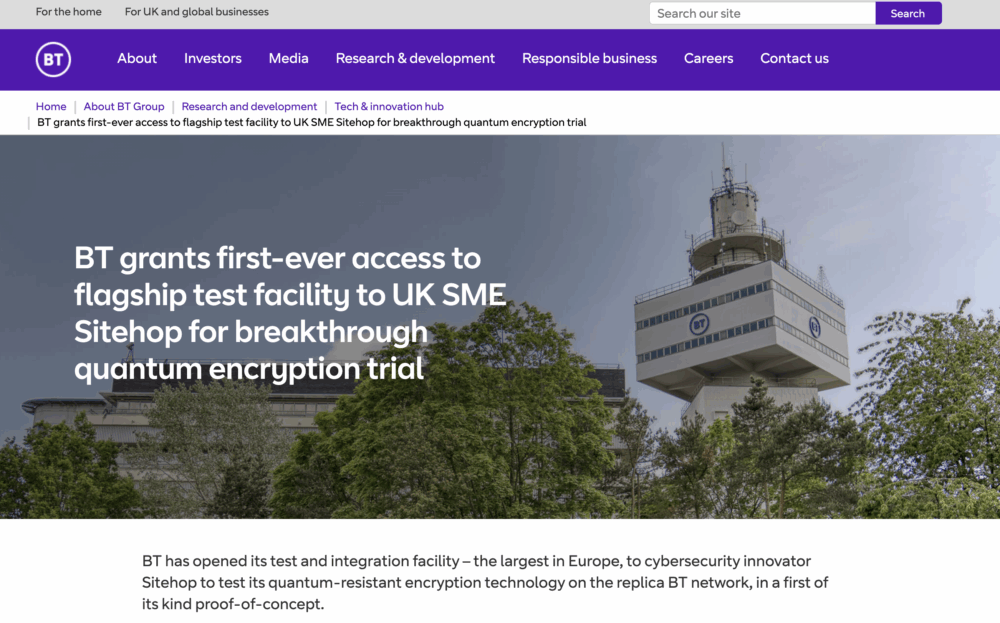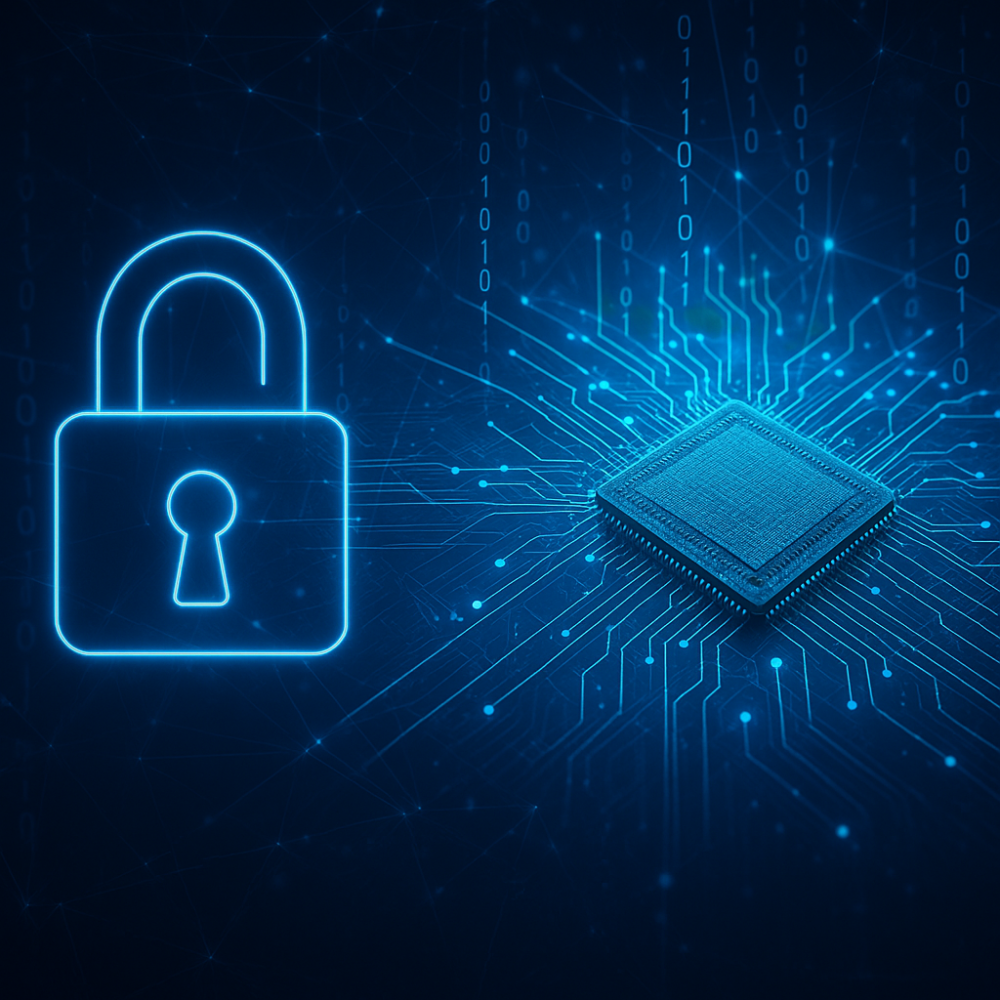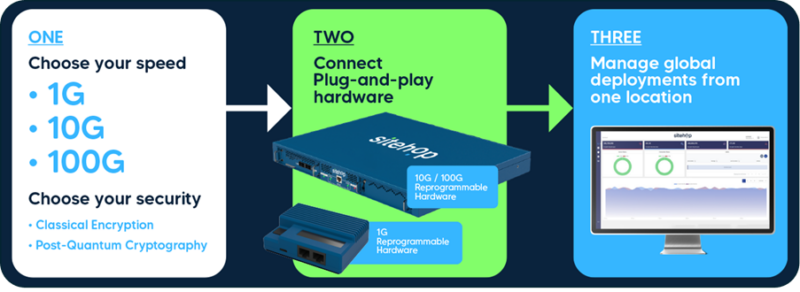
Secure, Scalable, and Sovereign: What Sitehop’s BT Trial Means for UK Telecoms
September 11, 2025 | BT, Latency, Post Quantum Cryptography, Sovereign Tech
Cybersecurity is at a turning point. As the quantum age approaches, today’s encryption will not hold up against tomorrow’s attacks. Techniques like ‘harvest now, decrypt later’ are already in play, and the risk is growing for telecom operators, large enterprises and public infrastructure.
That’s why Sitehop teamed up with BT to run a breakthrough trial at one of the most advanced telecoms testing grounds in Europe.
A UK-first for quantum-safe encryption
BT granted Sitehop the first-ever external access to its flagship test and integration facility, a secure replica of its live network environment. This facility is normally reserved for BT’s own internal development, making the opportunity a rare and powerful endorsement of UK cybersecurity innovation.
“Supporting SMEs is vital for the UK’s economic growth and innovation,” said Peter Bell, Managing Director of International Business and Adastral Park at BT.
“As a national champion for the UK, a key mission for BT is to help our customers build stronger, smarter, more secure businesses. An important part of this is helping innovative domestic companies to enter the market, to support supply chain sovereignty and help businesses to grow.”
What we tested and what we proved
Our goal was to show that encryption built for a quantum-safe future doesn’t have to come at the cost of speed or scale. The results were clear:
- 90Gbps throughput
- 75% reduction in power consumption
- Minimal packet loss and improved latency
- Just two clicks to configure and deploy
This was a full proof of concept in a real-world environment. The trial proved that our SAFE Series hardware can run high-speed encryption with near-zero impact on performance, even in demanding telecom conditions.
“With the right support or partnerships and commercial models,” Peter Bell continued, “we see there is potential for BT’s test and integration facilities to serve as a ‘UK PLC’ test facility that accelerates mission-led, high Technology Readiness Level innovations, contributing to a sovereign and secure UK telecoms sector.”
Why it matters now
The UK Government has named quantum one of its six ‘frontier technologies’ for long-term economic growth. To build a quantum-enabled economy, we need telecom infrastructure that is not only fast and resilient, but quantum-secure by design.
“This is a big moment that validates UK sovereign innovation can play a central role in the country’s digital infrastructure,” said Melissa Chambers, founder and CEO of Sitehop.
“We’re proving networks don’t have to sacrifice performance for security.”
Our solution is already live with a Tier 1 carrier across seven countries. It’s based on open IPsec protocols to avoid vendor lock-in and built with crypto agility, meaning firmware can be upgraded remotely as standards evolve.
Safe To Connect
Following the successful trial, BT has granted Sitehop its Safe to Connect certification, a recognition designed to help UK companies prove their technologies are robust enough for live telecom environments. This certification is more than a badge. It acts as a trust signal to operators, enterprises and government buyers that Sitehop’s technology meets the security, performance and integration standards expected in critical national infrastructure. It also marks an important step toward lowering the barriers that often keep innovative smaller companies out of telecom supply chains.
Moving forward together
BT’s collaboration with Sitehop is a signal to the broader ecosystem: it is possible for large and small players to work together to secure the UK’s national digital backbone.
“The initiative reflects BT’s ambition to strengthen the UK’s digital backbone by supporting domestic innovators and lowering barriers to market entry for small businesses,” said BT.
“It exemplifies how large and small/medium organisations can collaborate to protect the country’s national infrastructure and accelerate the UK’s quantum-enabled economy.”
To find out more, email info@sitehop.com
Or call us on: +44 (0)114 478 2366
Sitehop.
Engineered for speed. Built for the future.

Sitehop x AMD and the Next Generation of Encryption.
May 22, 2025 | AI, Post Quantum Cryptography, Security
As AI, hybrid cloud, and real-time data pipelines push network speeds to new heights, one thing is clear: security must keep up.
Traditional, software-based encryption methods are hitting their limits. They add latency, consume too much power, and create bottlenecks in performance-critical environments like data centers, telecom networks, and financial services. The future of secure connectivity demands a new architecture, engineered for speed, scalability, and crypto-agility.
The future demands the power and speed of a Sitehop and AMD partnership.
In our latest case study, we show how integrating the AMD Network Acceleration and Sitehop’s SAFEcore™ platform delivers a step change in encryption performance, without the compromises that legacy solutions face.
A Partnership Built for Speed and Security
At Sitehop, our mission is clear: deliver the world’s fastest, most efficient, post-quantum-ready encryption for data in motion.
AMD’s Network Accelerator was the perfect choice. Designed for ultra-low latency, hardware acceleration, and maximum energy efficiency, it powers Sitehop’s FPGA-based SAFEcore to secure real-time, high-throughput data movement across complex networks.
The benefits are immediate:
- Sub-microsecond latency encryption: Critical for AI, cloud, and 5G data flows.
- 10x better energy efficiency: Compared to traditional CPU-bound VPNs, cutting operational costs.
- Crypto-agile and PQC-ready security: Seamless upgrades to post-quantum encryption.
- Line-rate encryption up to 100Gbps: Protecting data without slowing down networks.
Why Hardware-First Security Matters
Today, speed without security is reckless. Security without speed is irrelevant.
Software-based encryption struggles with the demands of massive data volumes, multi-cloud environments, and emerging quantum threats. At the same time, cybercriminals are using AI to automate attacks, exploiting vulnerabilities faster than ever.
Hardware-enforced encryption minimizes attack surfaces, improves resilience, and delivers deterministic, reliable performance. It is becoming the gold standard for enterprises and service providers that cannot afford to compromise.
By combining Sitehop’s SAFEcore technology with AMD’s advanced SmartNIC hardware, organizations can now secure their networks at the speed that modern operations require.
Building for the Future
This partnership is about much more than current performance. It lays the foundation for a future shaped by:
- AI-driven cyber threats
- Quantum decryption risks
- Exponential global data growth
- Edge computing and decentralization
Networks have to be built for change, for scale, and for secure performance from the core to the edge.
With Sitehop and AMD, that future is within reach.
Engineered for speed. Built for the future.
Read AMD’s full case study to discover why hardware-first encryption is the future of secure networking. Then come back to us to discover the power of Sitehop’s solution.
Call us on: +44 (0)114 478 2366
Or email info@sitehop.com

Introducing the SAFE Series Range Updates
April 25, 2025 | IPSec, Post Quantum Cryptography, Security
The world’s leading modular Hardware-Enforced Security for the future of enterprise encryption.
In a world where security and performance can no longer be trade-offs, Sitehop’s SAFE Series and SAFEcore deliver both—without compromise. Designed for organisations that demand ultra-low latency encryption at scale, this high-performance platform redefines secure aggregation for data centres, telecoms, and critical national infrastructure. Sitehop’s proprietary FPGA architecture enables real-time, crypto-agile security that keeps pace with today’s demands—and tomorrow’s threats. Discover more at www.sitehop.com
These new additions and upgrades to the SAFE Series range which, in addition to greater range flexibility, can enhance speed and security now and provide the foundations for being PQC ready in the future.
- New product: SAFEencrypt 10G
- New Product: SAFEpqc 100G
- New product: SAFEpqc 10G
- New features: Sitehop SAFEnms™
The SAFE Series can be ready for on-site installation in minutes:

So why does this matter? Because as global cyber threats grow in sophistication, enterprises, telcos, and governments need encryption that doesn’t just keep pace but stays ahead. Traditional software-based encryption introduces latency, inefficiencies, and vulnerabilities—creating bottlenecks where security should be seamless.
The Sitehop SAFE Series changes everything. This modular, high-performance hardware encryption system delivers unmatched security for data-in-motion—ensuring ultra-low latency, crypto agility, and future-proofed PQC readiness.
Why SAFE Series? Addressing Key Industry Challenges.
Organizations today face mounting challenges:
- Performance Bottlenecks: Software-based encryption slows down networks, increasing latency in mission-critical operations.
- Post-Quantum Readiness: With quantum threats on the horizon, businesses need encryption that can seamlessly transition to PQC.
- Scalability & Availability: Mission-critical systems demand high-throughput encryption without downtime or performance trade-offs.
- Operational Complexity: Managing encryption at scale is challenging without centralized control and automation.
- Energy Consumption & Sustainability: Power-hungry encryption drives up costs and environmental impact.
The SAFE Series directly addresses these pain points—delivering an advanced encryption framework that protects today while preparing for tomorrow.
SAFE Series. Engineered for Now. Built for the Future.
The SAFE Series is designed to optimize security without compromising performance.
- Sub-Microsecond Latency– Secure real-time data with deterministic, ultra-fast encryption.

- End-to-End IPsec Security– Protects sensitive data across multi-domain networks without performance loss.
- Crypto Agility & PQC Readiness– Seamlessly upgrade cryptography as new standards emerge.
- Energy Efficient– Uses up to 10x less power than software-based encryption solutions.
- Scalability & High Availability– Modular system design allows hot-swappable upgrades for future expansion.
Simplified Encryption Management with Sitehop SAFEnms™
Managing encrypted networks at scale requires visibility, automation, and control. The Sitehop SAFEnms™ (Network Management System) delivers:
- Advanced Monitoring & Auditing: Real-time network insights for optimal performance.
- Role-Based Access Control (RBAC): Secure, multi-tenant user management for large deployments.
- Built-In PKI & Certificate Management: Simplifies cryptographic administration.
- REST API Integration: Seamless connection with existing management systems.
With the Sitehop SAFEnms™, organizations can streamline encryption management—ensuring effortless deployment, monitoring, and security policy enforcement across global networks.
A New Era of Secure Networking Starts Now
The SAFE Series isn’t just another encryption product—it’s a transformational shift in how networks are secured.
- Hardware-enforced, ultra-fast encryption for mission-critical networks.
- Seamless migration to PQC-ready security without costly upgrades.
- Scalable, high-availability encryption that integrates with modern network architectures.
Future-proof your encryption, maximize performance, and stay ahead of tomorrow’s cyber threats—today.
Talk to us about deploying the SAFE Series in your network today.
Sitehop. Engineered for speed. Built for the future.
Call us on: +44 (0)114 478 2366
Or email info@sitehop.com

Key takeaways from the NCSC’s urgent call for PQC migration
April 1, 2025 | NCSC, Post Quantum Cryptography
The Quantum Threat is Coming – Are You Ready?
The National Cyber Security Centre (NCSC) has just issued its strongest warning yet: the race to protect data from quantum threats has begun, and organizations must start preparing now. Their newly released PQC Migration Timelines report lays out a clear roadmap for transitioning to post-quantum cryptography (PQC), with a deadline of 2035 for full adoption.
For organizations handling sensitive data, the implications are clear—the security measures we trust today could be obsolete tomorrow. But the real question is: Are you prepared for a world where quantum computers can crack today’s encryption?
The Quantum Threat: Why Act Now?
Quantum computing has long been a futuristic concept, but it’s advancing faster than expected. When sufficiently powerful quantum computers arrive, they’ll have the ability to break traditional encryption methods like RSA and ECC—methods that protect everything from financial transactions to national security communications.
The risk isn’t just theoretical. “Harvest now, decrypt later” attacks are already happening, where adversaries collect encrypted data today, knowing they’ll be able to break it when quantum technology matures. That means data is already at risk, even before quantum computers become mainstream.
The NCSC’s Roadmap: When Should You Migrate?
The NCSC’s report outlines a phased migration plan:
- By 2028 – Identify and assess where cryptographic upgrades are needed
- By 2031 – Begin rolling out PQC solutions, prioritizing critical areas
- By 2035 – Complete the transition to quantum-safe encryption
This timeline might sound like a distant concern—but waiting is not an option. The transition to PQC is complex, and failure to act now could leave organizations scrambling to retrofit security under pressure.
What This Means for You
For enterprises and network providers, the message is clear:
- Encryption agility is key– Future-proof your networks with modular, adaptable cryptographic solutions.
- PQC readiness must start today– Inventory your cryptographic assets and assess vulnerabilities.
- Speed and performance matter– New encryption methods must secure data without sacrificing network speed and efficiency.
Sitehop: Engineered for Speed. Built for the Future.
At Sitehop, we’re not waiting for the quantum threat to arrive—we’re engineering security solutions now that are built for the future. Our SAFE Series encryption hardware is designed to support PQC-ready cryptography, ensuring that businesses can transition seamlessly when the time comes.
As the industry grapples with the reality of quantum threats, Sitehop is leading the way—offering encryption solutions that deliver high performance, low latency, and future-proof security.
Next Steps: Future-Proof Your Security Today
The NCSC’s guidance makes it clear: businesses that delay PQC adoption are exposing themselves to unnecessary risk. The time to act is now.
Learn more about the NCSC’s roadmap: Read the full report here
Discover how Sitehop is shaping the future of encryption: Explore our technology
Quantum computing isn’t waiting. Neither should you.

Crypto agility and future-proofing: key takeaways from NIST’s latest PQC selection
April 1, 2025 | Post Quantum Cryptography
The recent announcement from NIST selecting HQC as a fifth post-quantum encryption algorithm highlights a fundamental truth in cybersecurity: no single cryptographic standard is invulnerable. This decision reinforces why businesses must take a strategic approach to post-quantum cryptography (PQC)—one built on crypto agility and futureproofing rather than relying on a single solution.
What NIST’s Decision Means for Cybersecurity
NIST’s selection of HQC as a backup to ML-KEM is not just about having more options—it’s an acknowledgment that cryptographic algorithms can and will be broken over time. The primary concern is that if vulnerabilities emerge in ML-KEM, organizations need a secure and seamless migration path to an alternative. This aligns with Sitehop’s core philosophy: future-ready security isn’t about picking a single algorithm, it’s about having the ability to pivot quickly when threats evolve.
Key takeaways from NIST’s announcement:
- Diversity in Cryptographic Standards – HQC is built on different mathematical foundations than ML-KEM, reducing the risk of systemic failure if one algorithm is compromised.
- Standardization Timeline – NIST expects to release a draft standard for HQC within a year, with finalization expected by 2027.
- Security First Approach – By introducing a backup algorithm now, NIST is ensuring that organizations adopting PQC have a risk-mitigated path forward if new weaknesses emerge.
The Business Case for Crypto Agility
The reality is businesses cannot afford to ‘wait and see’ when it comes to PQC. The threat posed by quantum computing isn’t just theoretical. Cybercriminals are already harvesting encrypted data today with the intent to decrypt it in the future.
Without a crypto-agile strategy, organizations face:
- Costly, disruptive upgrades when existing encryption methods become obsolete.
- Regulatory/compliance risks as governments and industry bodies mandate PQC readiness.
- Increased exposure to cyber threats if they rely on a static encryption approach that cannot evolve.
A futureproof cybersecurity strategy must focus on crypto agility—securing data today while ensuring seamless adaptability for tomorrow. This means investing in hardware-accelerated, agile encryption solutions that allow organizations to pivot between cryptographic standards as needed.
The Technical Case for Crypto Agility
For security and IT leaders, the challenge isn’t just migrating to PQC—it’s ensuring that encryption frameworks can dynamically evolve without disrupting performance, scalability, or compliance.
Key technical considerations for a crypto-agile approach:
- Flexible Cryptographic Frameworks – Systems must support multiple PQC algorithms, ensuring adaptability as standards evolve.
- Seamless Algorithm Transitions – Organizations need encryption solutions that allow for on-the-fly updateswithout requiring costly infrastructure overhauls.
- Performance at Scale – As new cryptographic methods are adopted, encryption should not become a bottleneck for high-speed networks.
- Hardware-Accelerated Security – FPGA-powered encryption delivers the agility and
How Sitehop Delivers Crypto-Agility & Future-Proofing
At Sitehop, we believe that security should never be static. Our FPGA-powered encryption solutions are designed for seamless cryptographic agility, ensuring businesses can migrate between current and future PQC algorithms with minimal disruption.
- Agile encryption that evolves with new standards
- Post-quantum readiness with ultra-fast performance
- Hardware-enforced security that eliminates software inefficiencies
- 10x energy efficiency compared to traditional software encryption
Futureproof Your Security Today
NIST’s selection of HQC reinforces a critical cybersecurity truth: the encryption methods we trust today may not be secure tomorrow. A crypto-agile approach is no longer optional—it’s essential for long-term security resilience.
The future of encryption isn’t just about being ready—it’s about being able to adapt.
Is your security built for what’s next?

Harnessing FPGA power in the quantum era for true enterprise crypto agility
March 7, 2025 | Post Quantum Cryptography
The National Institute of Standards and Technology (NIST) has released its latest white paper on crypto agility, outlining the strategies and best practices for organizations to prepare for the inevitable transition to post-quantum cryptography (PQC). The report is a timely reminder that businesses, governments, and critical infrastructure providers must urgently rethink their encryption strategies to remain secure in a rapidly changing cybersecurity landscape.
At Sitehop, we see this as a pivotal moment—one that demands action, not just awareness. The race to post-quantum security has already begun, and organizations that fail to plan their crypto migration risk falling behind.
The Urgency of Crypto Agility
The quantum computing threat is real. While quantum computers capable of breaking today’s encryption are still in development, bad actors are already harvesting encrypted data, anticipating a future where they can decrypt it. This ‘harvest now, decrypt later’ strategy means that sensitive corporate and financial information is at risk long before quantum technology matures.
Beyond quantum threats, businesses must also navigate evolving compliance requirements. Regulatory bodies, including NIST (National Institute of Standards and Technology), are finalizing post-quantum cryptography (PQC) standards, mandating enterprises to rethink their cryptographic infrastructure today rather than waiting for forced transitions.
However, most organizations struggle with encryption transitions due to legacy infrastructure, performance trade-offs, and the operational complexity of upgrading cryptographic systems. This is where crypto agility becomes a game-changer.
The 5 Biggest Takeaways from NIST’s Research on Crypto Agility
NIST’s research highlights five key areas that organizations must address to achieve true crypto agility:
- Crypto Agility is Essential – Organizations must be able to quickly replace cryptographic algorithms without disrupting operations.
- The Quantum Threat is Imminent – Adversaries are already harvesting encrypted data today with the intent to decrypt it when quantum computing matures.
- Legacy Encryption is a Risk – Older encryption protocols cannot be upgraded easily, leaving organizations exposed to long-term vulnerabilities.
- Regulatory & Compliance Impact – Future government and industry regulations will require businesses to migrate to quantum-safe encryption, meaning early adopters will gain a competitive advantage.
- Interoperability Matters – Organizations must ensure that their new encryption strategies work seamlessly across hybrid cloud, telecom, and high-speed networks.
Why Traditional Solutions Fall Short
Organizations typically depend on software-based encryption, hardware security modules (HSMs), or trusted platform modules (TPMs) to protect their sensitive data. While these approaches provide a baseline of security, they introduce significant challenges:
- Software encryption slows down networks – It increases processing overhead, reducing throughput and adding latency.
- HSMs and TPMs are limited in scalability – Once deployed, they lack the flexibility to upgrade cryptographic algorithms without a full system overhaul.
- Relying on static encryption creates vulnerabilities – Legacy encryption methods can remain in use long after they have been compromised, simply because replacing them is complex and costly.
To overcome these barriers, enterprises must embrace a future-proof security model that allows cryptographic systems to evolve without compromising performance.
The FPGA-Driven Approach: A Revolution in Crypto Agility
Field-Programmable Gate Arrays (FPGAs) provide the best of both worlds—hardware-level security with software-like flexibility. Unlike traditional hardware solutions, FPGAs can be reprogrammed on demand, enabling enterprises to adapt encryption methods as new cryptographic standards emerge.
The Business Benefits of FPGA-Powered Crypto Agility:
- Seamless Transition to PQC: Enterprises can migrate to post-quantum cryptography without the need for costly hardware replacements.
- Ultra-Low Latency Encryption: Unlike software-based encryption, FPGA-driven solutions operate at line-rate speed, eliminating security bottlenecks.
- Future-Proof Security: New cryptographic algorithms can be deployed with minimal operational disruption.
- Energy Efficiency: FPGA-based solutions consume significantly less power than traditional software encryption methods, aligning with corporate sustainability goals.
The Competitive Edge of Agile Security
Crypto agility is no longer just a technical necessity—it’s a strategic advantage. Organizations that adopt agile encryption solutions are not only protecting against future threats but also optimizing for performance and efficiency today.
In industries such as finance, telecom, and cloud services, where high-speed, high-security data transactions are critical, FPGA-driven encryption is emerging as the de facto standard for securing data-in-motion without performance trade-offs.
Future-Proofing Security with Crypto Agility
Enterprises that fail to prioritize crypto agility will face higher costs, greater security risks, and regulatory roadblocks as the shift to post-quantum encryption accelerates. Forward-thinking businesses are already integrating hardware-accelerated, crypto-agile security solutions to ensure seamless adaptability in the face of evolving threats.
At Sitehop, we believe security should enable, not hinder, enterprise growth. Our FPGA-powered encryption solutions deliver quantum-ready, high-performance security that adapts as fast as the digital landscape evolves.
The question isn’t if the quantum threat will arrive. The question is: Will your enterprise security be ready?


